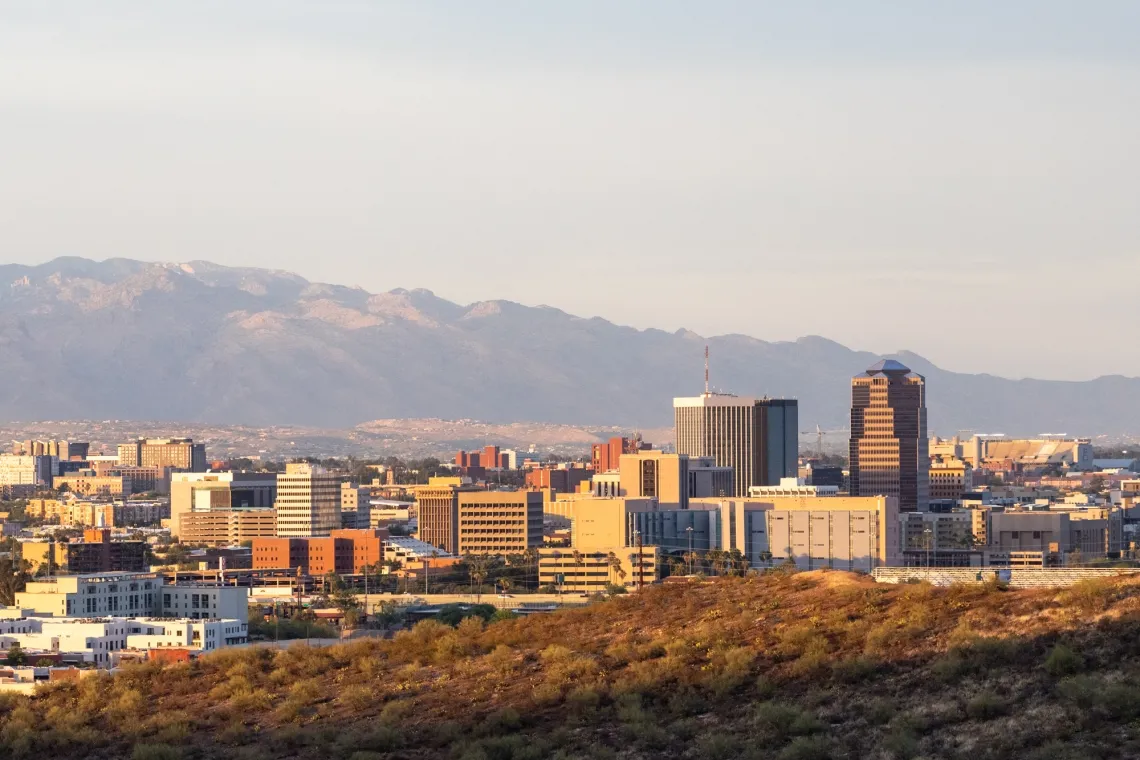UArizona Researchers Awarded $3.5M to Fight Extreme Heat

Tucson on Saturday, June 11, 2022, hours after temperatures topped out at 109 degrees Fahrenheit, just two degrees shy of the June 11 high record, set in 1933. Photo by Kyle Mittan, courtesy University Communications.
By Kyle Mittan, University Communications
University of Arizona researchers have received $3.5 million from the U.S. Department of Energy to study the challenges that increasingly extreme weather pose to some of Arizona's largest cities. Their findings will help inform policy decisions that could make cities more resilient to climate change.
The research is part of a larger Department of Energy project, called the Southwest Urban Corridor Integrated Field Laboratory, or SW-IFL, announced Monday. In addition to UArizona, the laboratory will include research teams from Arizona State University and Northern Arizona University. Together, they will study climate in the Sun Corridor, a swath of the state that includes the urban areas of Prescott, Phoenix and Tucson. The laboratory's research will also extend to the Navajo Nation in northern Arizona, and areas near the U.S.-Mexico border.
The laboratory is part of a Department of Energy effort to study the effects of climate change on urban areas across the U.S. through what DOE calls Urban Integrated Field Laboratories. The three Arizona universities will receive a total of $25 million over five years to establish the laboratory, with UArizona's share being $3.5 million.
Ladd Keith, an expert on heat policy and governance and a UArizona assistant professor of planning and sustainable built environments, will lead a team of nine researchers and staff from the College of Architecture, Planning and Landscape Architecture, the College of Agriculture and Life Sciences, the College of Social and Behavioral Sciences and the Mel and Enid Zuckerman College of Public Health.
Keith is co-principal investigator for the laboratory; David Sailor, a professor in ASU's School of Geographical Sciences and Urban Planning, is the principal investigator. The laboratory's teams also include researchers from IBM and from Brookhaven National Laboratory and Oak Ridge National Laboratory—research institutions that are sponsored by the DOE.
Unique climate challenges caused by urban growth, heat and scarce water
As one of the fastest-growing areas in the U.S., the Sun Corridor faces unique climate change-related challenges, Keith says. The area is already prone to scorching summers and a dire water supply situation as the Colorado River, the state's primary water source, has dwindled in recent decades.
"We're already hot and facing water scarcity—both made worse by climate change," says Keith, who is also a faculty associate at the university's Udall Center for Studies in Public Policy. "This will be one of the most sophisticated attempts to understand complex urban climate systems from the atmosphere all the way to the ground, and then translate that into information and tools to help policymakers create a more resilient urban corridor in Arizona."
The grant builds upon UArizona's existing research on the effects of climate change and potential solutions for the state.
"The University of Arizona is a leader in studying the effects of climate change, particularly extreme heat, and we have long used that expertise to help Arizonans understand the challenges we face in a warming world," says University of Arizona President Robert C. Robbins. "This is an important part of our mission as Arizona's land-grant university, and I am proud that the U.S. Department of Energy has entrusted our researchers with a project that will shed more light on how our state can become more heat resilient."
Several projects that UArizona researchers will undertake as part of the larger SW-IFL collaboration include:
- A study led by Keith that will explore how cities' plans and policies influence urban heat across the Sun Corridor.
- A study of how heat influences travel behavior across the Sun Corridor, led by Kristina Currans, assistant professor in CAPLA, and Heidi Brown, associate professor in the Mel and Enid Zuckerman College of Public Health.
- A study led by Mark Kear, assistant professor in the School of Geography, Development and Environment in the College of Social and Behavioral Sciences, exploring indoor home thermal comfort and heat risk across the Sun Corridor.
- A six-week research experience for undergraduate students from all three state universities to map the urban heat island effect in the Sun Corridor. Urban heat islands occur when urban areas are hotter than the surrounding rural areas.
- Expansion of Arizona Project WET, an existing educational outreach program of the UArizona Water Resources Research Center that provides K-12 teachers with resources to teach water and science literacy. Holly Thomas-Hilburn serves as program manager for Arizona Project WET.
The other UArizona researchers on the project are:
- Gregg Garfin, director of the Southwest Climate Adaptation Science Center in the Arizona Institute for Resilient Environments and Societies and associate professor in the School of Natural Resources and the Environment in the College of Agriculture and Life Sciences
- Kenneth Kokroko, assistant professor in CAPLA
- Chris Lim, assistant professor in the College of Public Health
- Philip Stoker, associate professor in CAPLA



